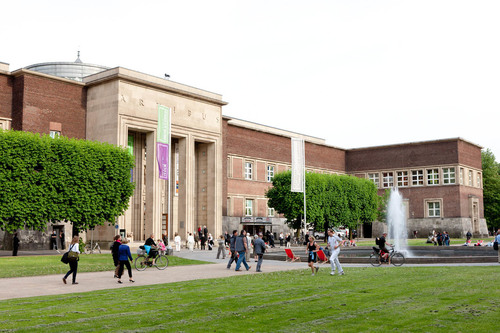Germany

Germany - Space UK in Dusseldorf
Space UK in GermanyDüsseldorf – 10th – 14th May 2004
The Space UK exhibition and events were formally opened by Mr Tessel, director of the Medienzentrum, Mr Folland, Deputy British Consul for the region and Mr Grishop, Head of Education at the British Council in Germany.Over 200 secondary school students from 7 schools in the region came to experience and discover the solar system at the British Council Space UK exhibition and workshops at the Medienzentrum Rheinland in Duesseldorf.
![/userfiles/files/dusseldorf1.jpg [/userfiles/files/dusseldorf1.jpg]](/userfiles/files/dusseldorf1.jpg)
(The schools were the Gymnasium Wuelfrath, the Duisberg Laufermann Gymnasium, the Duisberg Abtei Gymnasium, Hildergardis Gymnasium in Bochum, the Humboldt Gymnasium, the Hulda Pankok Gesamtschule and the Alfred Adler Schule in Duesseldorf.)The students watched the Nick Parks classic ‘A Grand Day Out’ and then, warmed up to the idea of space travel, came to a robot building workshop where they worked in groups to construct robots from kits produced by Middlesex University Teaching Resources (www.mutr.co.uk).
![/userfiles/files/dusseldorf2.jpg [/userfiles/files/dusseldorf2.jpg]](/userfiles/files/dusseldorf2.jpg)
The ‘Moon Wanderer'
![/userfiles/files/dusseldorf3.jpg [/userfiles/files/dusseldorf3.jpg]](/userfiles/files/dusseldorf3.jpg)
The ‘Moon Walker’
These kits included ‘IQ’ – a programmable robot, a ‘Moon Walker’, a ‘Wandering Robot’, a ‘Moon Rover’ and several ‘Jitterbug Robots’. The students were asked to evaluate the strengths and weaknesses of their robots and present their robot to the whole group. Worksheets written for this activity to support students in giving their presentations.
Each of the schools was presented with Exhibition CD materials and pens as well as a robot to take away with them. Finally, students were given the chance to enter the British Council ‘Unlock the secrets of the solar system’ exhibition quiz where the winner will take their family on an all-expenses-paid trip London to visit the National Science Museum.
![/userfiles/files/dusseldorf4.jpg [/userfiles/files/dusseldorf4.jpg]](/userfiles/files/dusseldorf4.jpg)
The ‘Jitterbug’
![/userfiles/files/dusseldorf5.jpg [/userfiles/files/dusseldorf5.jpg]](/userfiles/files/dusseldorf5.jpg)
The ‘Moon Rover’
![/userfiles/files/dusseldorf6.jpg [/userfiles/files/dusseldorf6.jpg]](/userfiles/files/dusseldorf6.jpg)
Designing rockets
Students also worked on paper rocket design and launching. They were asked to consider the size, shape and structure of their rockets and how this will effect flight and they had to think up an impressive design. Prizes of CDs and pens were offered to the best rockets.The afternoon was open to teachers interested in discussing the issues in integrating language and content.
Teachers were offered an insight into the Science Across the World programme of exchanges, offered free subscription to the Science Across the World (www.scienceacross.org) programme and were introduced to the topic ‘Science Across Space’ where they were asked to investigate the cultural and social implications of space exploration and science for Germany.They were also presented with information on networks of teachers working in the teaching of EMI - English as a Medium for Instruction. This included visiting the FACTWorld website (Forum for Across the Curriculum Teaching) where teachers can find information on EMI as well as download EMI materials such as those used at this workshop.
Other sites visited were the PPARC (The Particle Physics and Astronomy Research Council) website where teachers can download wonderful wall posters and teachers’ notes dedicated to the theme of Space (http://www.pparc.ac.uk/Ed/pubs.asp (go to ‘public and schools’ and ‘free publications’).
Website presentations also included the website of ASE – the Association for Science Education at www.ase.org.uk (go to ‘resources’) where teachers can find valuable materials on 6 CDs written to celebrate Science year in the UK. These CDs include the CD ‘Is there life?’ which is dedicated to the topic of space exploration, the solar system, and where students can create their own planet, create its biology, chemistry and physics and then launch their planet into the solar system to see how might get on in reality.
![/userfiles/files/dusseldorf7.jpg [/userfiles/files/dusseldorf7.jpg]](/userfiles/files/dusseldorf7.jpg)
Launching rockets
It sounds corny to say it, but, ‘We have lift off!’